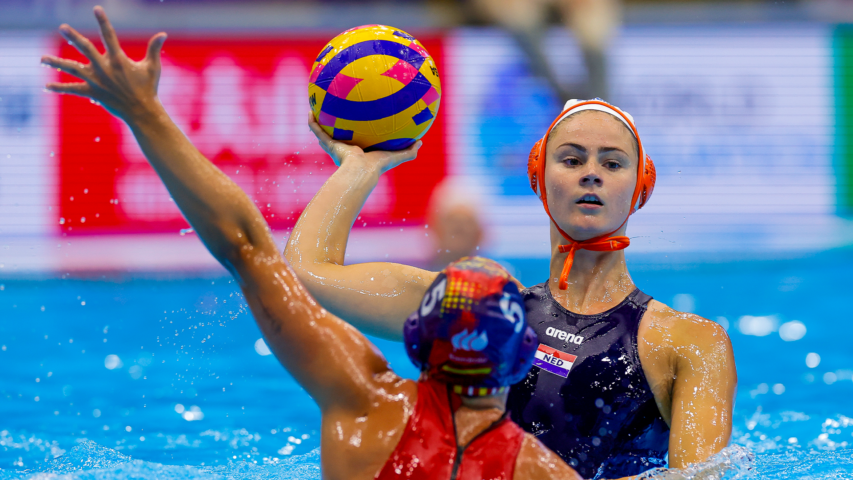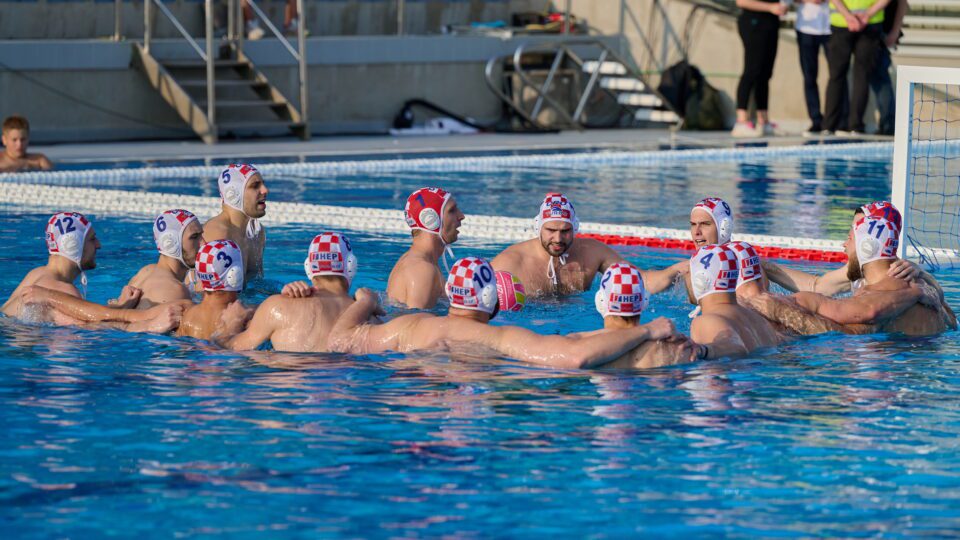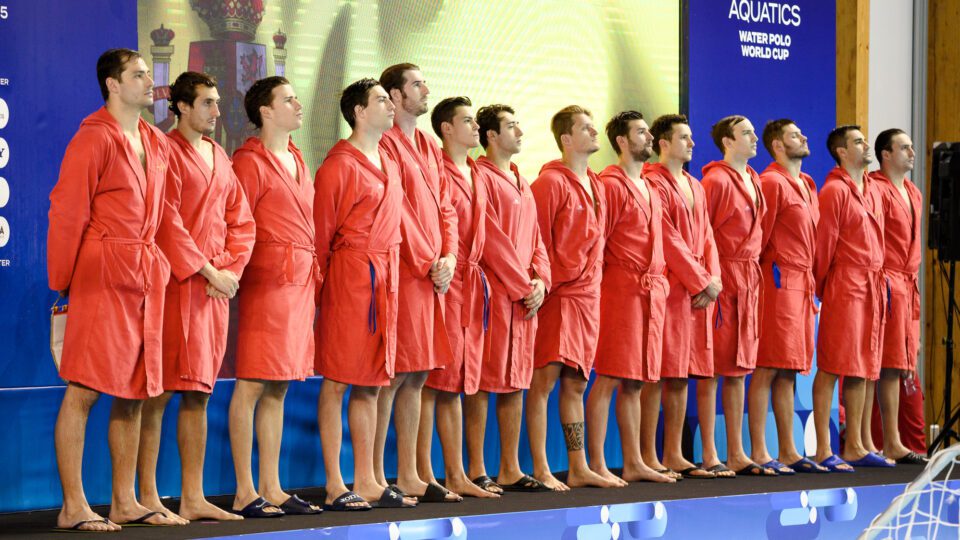Eindhoven is accustomed to being a place where water polo history is made.
Twelve years ago, the city became the first in the Netherlands to host the European Water Polo Championships. Additionally, the Eindhoven tournament in 2012, the 19th edition of the women’s competition, became the first to be held in the winter, unlike the previous editions that were perennially held in the summer.
This month, between 5-14 January, the 20th women’s European Championships return to the Pieter van den Hoogenband pool in Eindhoven, anchoring another innovation – the first female Euros to feature sixteen teams.
The additional four participants reflect the expansion of the women’s game across Europe. In a literal sense, this will be the largest women’s European Championships since the tournament’s inception in 1985.
The men’s competition will run concurrently in two Croatian cities; Zagreb and Dubrovnik.
Heading to Eindhoven? Read our travel guide now!
Tournament format
This time, teams will be in two groups: Division 1 and Division 2. The best eight teams are in Division 1, and the qualifiers are in Division 2. Each division has two groups with four teams. The top two teams from each Division 1 group go straight to the quarterfinals. The other two teams in each group play a playoff against one of the top two teams from each Division 2 group. From the quarterfinals onwards, it’s a regular knockout system.
FOLLOW ALL THE GAMES LIVE VIA TOTAL ARENA’S LIVESCORE PAGE
2024 European Championships, Women – Eindhoven 2012
Division 1
Group A – Netherlands, Hungary, Croatia, Greece
Group B – Spain, Israel, France, Italy
Division 2
Group C – Romania, Serbia, Czech Republic, Turkey
Group D – Slovakia, Germany, Great Britain, Bulgaria
Match Schedule
Three-peats, Olympic qualification and shooting for the stars
These European Championships are laden with overlaping narratives for several nations, setting the stage for an incredibly well-poised tournament.
First and foremost, the sixteen teams journeying to Eindhoven dream of a top-of-the-podium finish, although the number of realistic competitors can be counted on one hand. While much of the talk will center around Olympic Qualification (more on that in a minute), the objective of becoming a European Champion should not be diminished.
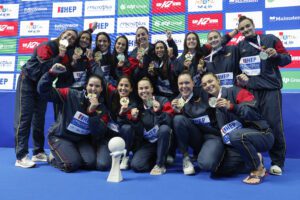
Spain are searching for their third successive European title (Budapest 2020 and Split 2022). Photo: Total Waterpolo.
Spain will absolutely set their hearts on achieving the three-peat, winning a third successive European title – a feat accomplished by the great Dutch team of the 80s, the untouchable Italian side of the early 90s, and the unrelenting Russians of the late 00s. The Netherlands, on the other hand, are desperate to follow up their World Championship heroics with a memorable victory in front of an Euphoric home crowd – to take home a title they have not held since 2018.
Even a team like Greece, who have never won a European Championship despite reaching four finals (including in 2022), will feel a European triumph is long overdue. Italy aims to summon the spirit of 2012, with Eindhoven being the last time the Setterosa won gold at a major international tournament. Hungary seeks to find some consistency under their new co-coaches, Attila Mihok and Sandor Cseh – who lead the Magyars into their first tournament.
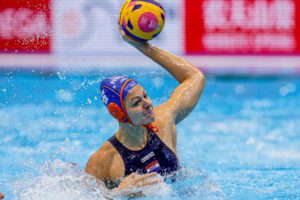
Total Player Award Winner 2023 Simone Van de Kraats.Photo: Orange Pictures.
The reigning World Champions and the hosts, the Netherlands, have won the European Championships more than any other nation, taking gold on five occasions (1985, 1987, 1989, 1993, 2018)
Granted, Spain and the Netherlands need not fret about Olympic qualification, as both secured their tickets to Paris in Fukuoka. However, for the likes of Hungary, the Olympic bronze medalists in 2020, and Italy and Greece, they all want to guarentee their Olympic tickets sooner rather than later.
Regarding Olympic qualification, only one berth is allocated in Eindhoven, meaning a gold medal would automatically guarantee qualification for the Olympics – unless the first two spots are occupied by the Netherlands and Spain, in which case a bronze medal would be enough to qualify for Paris.
For those not expecting to reach the podium or qualify for the Olympics, there is still much to play for; to progress to February’s Doha World Championships, and just for pride.
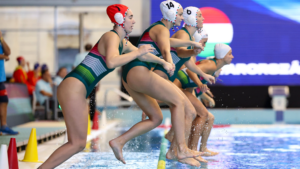
Hungary are yet to qualify for the Paris Olympic Games. Photo: Waterpolo.hu.
Concerning the World Championships, Netherlands, Spain, Italy, and Hungary are already qualified with their results in the World Cup and the World Championships, respectively. Providing these four teams reach the quarter-finals, this, in essence, means that a top seven spot would guarantee a World Championship berth for the likes of Greece, France, and Israel. Depending on results, Croatia or Great Britain may even feel they have a chance of making this competition…
Bulgaria are making their Euro’s debut in Eindhoven, while Great Britain return to the competition for the first time in ten years.
Away from the big picture, the importance of simply reaching this competition for some of the less established nations should not be lost on spectators. The debut appearance of Bulgaria is welcomed, as well as only a second appearance for Romania, a third appearance for Turkey, and fourth appearances for Israel, Czechia, Slovakia, and Great Britain.
Who are the favourites?
The favorites for the European Championships are undoubtedly the finalists of the 2023 World Championships in Fukuoka: the Netherlands and Spain. These two teams are incredibly strong and evenly matched, as highlighted by the fact that they could only be separated by penalties in the nail-biting final back in July, which the Dutch ultimately won.
Much of the focus for both teams will be on their show-stopping left-handers. Simone Van de Kraats, recently crowned as the Total Player Award winner in 2023, continues to dominate for the Dutch on the right, while Judith Forca, the top goal scorer at the last two world championships, is equally formidable. Both sides are stacked with class and quality at center, around the perimeter, and between the sticks, seemingly having too much for their respective opponents. The teams are also very familiar, especially since eight of the Dutch team play their water polo in Spain.
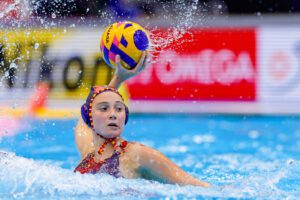
Elena Ruiz is one of Spain’s deadliest shooters operating on the perimeter. Photo: Orange Pictures.
We have already mentioned what is at stake for the Spanish and the Dutch, and what a golden January would mean for the two nations. However, given their tickets to Doha and Paris are already booked, the chasing pack will no doubt have a greater incentive to succeed at this competition. The question is, who can pose the most credible challenge to the ostensible favorites?
Italy, who took bronze at the last European and World Championships, is probably next in line. The Setterosa have gone from strength to strength under Carlo Silipo and bring a well-rounded side to Eindhoven. At the junior end, Dafne Bettini and Sofia Giustini are already at the pinnacle of the women’s game, while the experienced Roberta Bianconi has been operating there for years and shows no signs of letting up. Their final group-stage match with Spain will tell us what we need to know about the Italians.
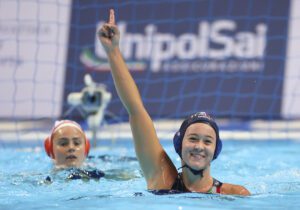
Sabadell and Italy’s Sofia Giustini can birng any game to life. Photo: Total Waterpolo.
Who knows what we will see from Hungary? It’s the million-dollar question, clearly indicated by their lukewarm 5th and 6th place finishes at the last European Championships and World Championships, respectively. While Attila Mihok and Sandor Cseh have only been at the helm for less than half a year, there is a desperation for results, and quickly. With Rita Keszthelyi in the side, they always have a chance. The quality of Greta Gurisatti, Kriztina Garda, and Rebecca Parkes (to name but three) will always pose a danger, but the Magyars need to find momentum if they stand any chance of replicating their bronze medal from Tokyo. Perhaps Eindhoven is the perfect springboard.
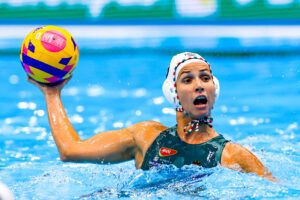
Rita Keszthelyi has scored over 700 goals for the Hungarian national team. Photo: Orange Pictures.
Greece were brilliant in Split back in 2022 and more than deserved their silver medal. Since then, however, they haven’t kicked on, certainly not in terms of results. The squad is still relatively young, perhaps why Alexia Kammenou opted to restore 35-year-old Alexandra Asimaki to the national team. Nikoleta Eleftheriadou also returns to the side, alongside seven other Olympiacos players. A strong start will be vital for the Greeks as they take on Hungary at 19:30 on 5th January – the headline match to kick the tournament off.
It will be genuinely interesting to see if the likes of France or perhaps Israel can make any inroads and take a medal in Eindhoven. Both have shown immense growth in the last two years. Both should be nailed on for top-eight finishes, and both will hope to guarantee they qualify for Doha as a minimum.
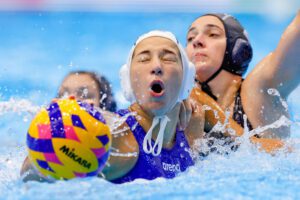
Sparks always fly when Israel and France meet in the pool. Photo: Orange Pictures.
Lower down the competition, there is big excitement about who will come out on top in Group C, which looks very open and features Romania, Czechia, Serbia, and Turkiye. Great Britain and Germany will be a very entertaining watch; with the winner likely to earn the opportunity to challenge a tier-one team in the crossovers.
More articles about the European Championships
Read more about Women’s water polo
Follow us on Facebook, Twitter and Instagram.
For more video content, subscribe to our Youtube Channel and Tik Tok account



